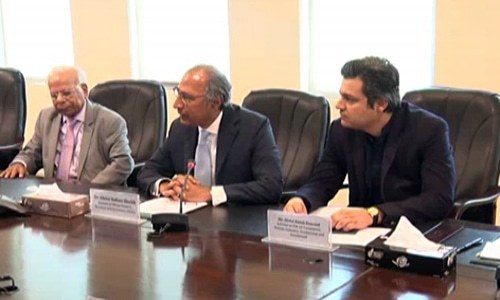With the deadline for the government's Asset Declaration Scheme looming near and with media rife with speculation regarding an extension, chairman of the Federal Board of Revenue Shabbar Zaidi on Saturday issued a statement categorically denying any extension would be given.
"No extension is being provided in the Asset Declaration Scheme," read the statement.
The FBR confirmed that June 30 was the final date for people to enter into the scheme and declare assets.
Prime Minister Imran Khan had on Thursday hinted at an extension in the Asset Declaration Scheme in order to avoid inconvenience caused to citizens by the June 30 deadline.
During a special PTV transmission with the prime minister in attendance via video link, business tycoon Aqeel Karim Dedhi had asked the premier whether he would consider an extension in the deadline.
"I think the number of people interested in the scheme could be much larger if there was some clarification on what the purpose of this is, whether people have to deposit cash by June 30, whether this deadline can be extended by a couple of months. For instance, if you could register first and make the 4 per cent penalty payment, but deposit cash in the bank later?" he had proposed.
Prime Minister Khan had noted that although it appeared that leaving things until the last minute was a Pakistani trait, he was "considering it, because there's a lot of pressure, and lots of people are saying that there is too little time left to register".
The International Monetary Fund (IMF) has voiced opposition to the idea of extending the deadline for the amnesty scheme, saying doing so could hurt the country’s case at the Board meeting that is scheduled to take up Pakistan request for a $6 billion bailout package on July 3.
“The IMF is not in favour of tax amnesties,” IMF’s country representative to Pakistan Teresa Daban Sanchez told Dawn on Friday.
Commenting on Prime Minister Imran Khan’s indication to extend the amnesty scheme and come up with a plan within 48 hours, the IMF official said, “Cross country experience shows that tax amnesties have usually huge costs, such as undermining taxpayers’ morale and sense of fairness, that more than offset potential short-term gains.”
When asked whether an extension could hurt Pakistan’s case at the Board, she said, “I think so, it will certainly not help at all because it is inconsistent with the whole package.”
The amnesty scheme
The government's tax amnesty scheme is aimed at whitening of undisclosed expenditures, sales and assets, including foreign assets, at nominal tax rates. It was approved by the cabinet after much deliberation and was announced earlier this month by Adviser to the Prime Minister on Finance Dr Abdul Hafeez Shaikh.
The scheme had come into effect through a presidential ordinance, which offered a period of 45 days to people for declaration of their undeclared assets, expenditures, and sales along with payment of taxes until June 30 this year.
The scheme has five main pillars — scope, default surcharge, exclusions, tax rates and conditions. It can be availed by all companies, associations of persons and individuals only to whiten their assets, expenditures and sales not declared until June 30, 2018. There is no provision for whitening undeclared incomes, either domestic and foreign.
Under the scheme, assets within the country and abroad (except for real estate) can be whitened after paying a rate of four per cent. The whitened cash assets will have to be kept in Pakistani bank accounts.
For people wanting to keep their whitened money abroad, a rate of 6pc will be charged.
For the declaration of real estate, its value will be considered 1.5 times more than the FBR-assigned value to bring it at par with the market rate, Dr Shaikh had said.
The amnesty scheme also has the facility for citizens to whiten their benami accounts and properties before the Benami Transaction (Prohibition) Act, 2017, is enforced.
The scheme was announced two days after the government reached a staff-level agreement with the International Monetary Fund about a $6bn bailout to implement an “ambitious structural reform agenda” over a period of 39 months.
In a video message on May 30, the prime minister had said that the scheme was a "chance for [the people] to declare their benami properties and bank accounts" so they can become a part of the tax net.
He had revealed that only 1 per cent of the population pays taxes. "1pc Pakistanis are bearing the burden of 220 million people. This is impossible," he had said. "No country can serve its people if the citizens don't pay taxes."















































